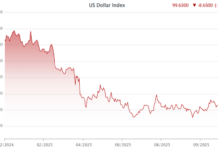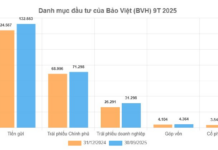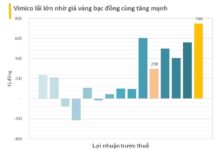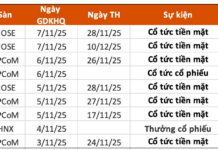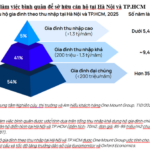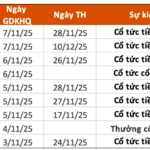The Housing Price Spiral – A Supply Shortage
According to experts, the primary reason for the recent surge in housing prices, pushing them to record highs, is the prolonged shortage of primary supply nationwide. This is particularly evident in the absence of affordable, middle-income housing options.
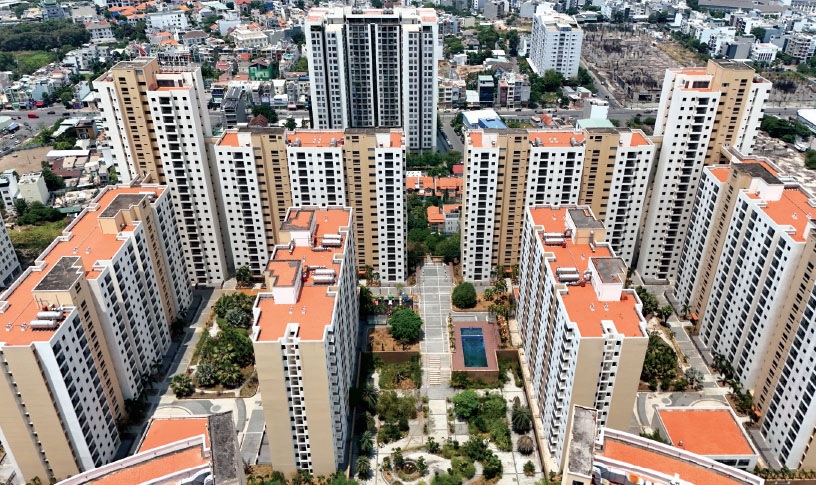 The main driver of rising housing prices is the scarcity of primary supply. Photo: LÊ VŨ
|
Recently, the Ministry of Construction proposed three mechanisms to control and stabilize real estate prices: transparent transactions through a state-managed Real Estate and Land Use Rights Exchange Center; loan policies to support homebuyers; and the development of affordable commercial housing.
Ms. Phạm Thị Miền, Deputy Director of the Vietnam Real Estate Market Research Institute (VARS IRE), stated that the policy to develop affordable commercial housing directly addresses the core issue driving high property prices.
VARS IRE data reveals a market imbalance, with over 60% of properties being high-end apartments, while affordable housing has nearly disappeared, especially in Hanoi and Ho Chi Minh City.
Prolonged legal hurdles have delayed many projects, resulting in a lack of new developments ready for sale in Hanoi and particularly Ho Chi Minh City during 2021-2025.
Additionally, rising land and construction costs have impacted developers’ investment returns. This has led to a 45% annual decline in affordable housing supply over the past five years, nearly eradicating this segment.
The draft policy for affordable commercial housing does not yet specify buyer eligibility but caps profits at 20% of total project investment. This is a positive, clear step by the Ministry of Construction to address social housing needs.
However, businesses face challenges like planning, legal approvals, capital costs, and long-term investment stability. These are significant barriers that need resolution beyond profit margin considerations.
A 5-10 year legal delay can multiply capital costs, erode profits, and damage buyer trust and investor reputation, emphasized Ms. Cao Thị Thanh Hương, Senior Manager at Savills Vietnam’s Research Department.
Finding Viable Solutions for Affordable Housing
Mr. David Jackson, Managing Director of Avison Young Vietnam, believes increasing affordable commercial housing supply is crucial for helping real buyers access homes. However, the policy’s feasibility depends on specific solution details.
While laws for commercial housing exist, effective implementation and market regulation are key. Mr. Jackson also suggests clarifying mechanisms for long-term rental housing, not just sales.
 Vietnam needs anti-speculation taxes, credit controls, rental housing, and infrastructure to stabilize the market. Photo: H.P |
To balance supply and demand and cool property prices, he recommends: anti-speculation taxes, credit controls, promoting rental housing, and expanding inter-regional infrastructure, satellite cities, and public transport for sustainable population distribution.
A representative from Bcons, a developer of affordable housing, stated that affordable commercial housing is urgent and feasible, given high demand for homes under 2 billion VND in Ho Chi Minh City and surrounding areas, with limited new supply.
The market shows high absorption rates for apartments priced 1.4-2.3 billion VND, popular among young professionals and workers earning 20-30 million VND monthly, a large urban demographic.
These buyers have genuine housing needs, not speculative, fostering market sustainability. Bcons’ affordable projects achieve high sales shortly after launch.
The company manages costs through design optimization, BIM technology for error reduction, and supply chain control, maintaining quality while offering affordable homes for young families.
Mr. Lê Minh Hoàng, Director of a bank’s Asset Valuation Center, notes that unlike social housing, “affordable commercial housing” will be market-driven but with incentives like reduced land fees, streamlined procedures, and infrastructure support to lower costs and ensure reasonable profits.
The attractiveness of these incentives will motivate developers to shift to this segment, especially with higher margins in mid- and high-end segments. Weak policies or red tape may deter participation.
Mr. Võ Huỳnh Tuấn Kiệt, Director of CBRE Vietnam’s Housing Marketing, highlights the need for clear “affordable” criteria (e.g., price caps or income ratios) to prevent abuse.
Low margins won’t attract developers unless land costs, capital, and administrative hurdles are addressed.
There’s also a risk of repeating past issues with the 20% social housing policy, like substitution fees or poorly located low-income units, leading to social stratification.
Success depends on tangible incentives and streamlined, transparent processes.
On the demand side, experts advocate anti-speculation taxes (e.g., progressive property taxes or high short-term transaction taxes) and selective credit controls to target speculators.
To achieve affordable housing goals, authorities should: regulate credit for multiple property owners, mandate transactions through exchanges, require cashless payments, and establish a national property database for transparency.
Hoàng An
– 19:00 28/10/2025
“Households Earning Under $8,700 Annually Require Over 35 Years of Savings to Afford a Home”
According to calculations by One Mount Group, a middle-income household (earning less than 200 million VND annually) has virtually no access to commercial housing, requiring over 35 years of savings to afford it.






